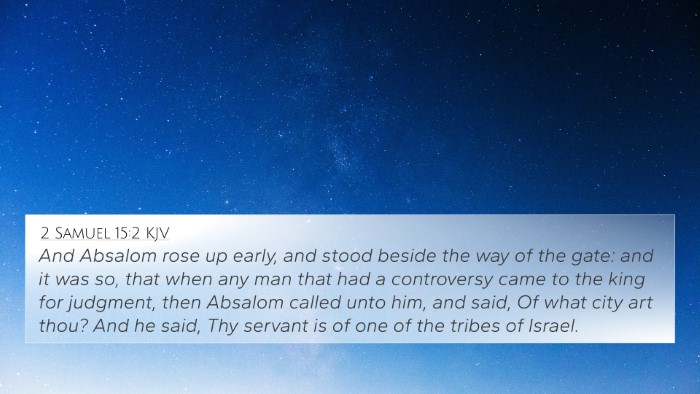Understanding 2 Chronicles 10:7
2 Chronicles 10:7 states: "And they spake unto him, saying, If thou be kind to this people, and please them, and speak good words to them, they will be thy servants for ever." This verse is part of the narrative where Rehoboam seeks counsel on how to respond to the people of Israel after the death of his father, Solomon.
Contextual Analysis
In this chapter, Rehoboam's decision-making is pivotal for the future of the kingdom. The verse captures a moment where the young king is advised by the older advisors to adopt a compassionate stance towards his subjects, contrasting with the advice from his peers.
Commentary Insights
- Matthew Henry: Henry emphasizes the importance of wisdom in leadership. He notes that the elders' advice encourages Rehoboam to foster loyalty through kindness, suggesting that a ruler's heart should be inclined towards merciful governance to maintain peace.
- Albert Barnes: Barnes suggests that this advice underscores the principle that good leadership is based on understanding and valuing those whom one leads. He interprets the elders’ counsel as recognizing the people's needs and emotions, which are essential for a harmonious ruling.
- Adam Clarke: Clarke points out the implications of Rehoboam's choice. He discusses how the advice reflects the sociopolitical landscape of the time, portraying the expectations of the populace regarding their leaders. Clarke stresses that speaking kind words can significantly impact public opinion and stability.
Key Themes and Lessons
This verse reveals several crucial themes:
- Kingship and Leadership: The necessity of empathy and kindness in leadership is underscored.
- Wisdom in Counsel: The contrast between the advice of the older and younger advisors illustrates the importance of seeking wise counsel.
- Service and Loyalty: The expectation that kindness will lead to a lifetime of loyalty highlights the reciprocal nature of relationships between leaders and their people.
Bible Verse Cross-References
This verse connects richly to various other Scriptures that reflect similar themes:
- Proverbs 15:1: "A soft answer turneth away wrath: but grievous words stir up anger." The essence of gentle speech reflected here aligns with the advice given in 2 Chronicles 10:7.
- Matthew 20:26-28: "But it shall not be so among you: but whosoever will be great among you, let him be your minister." This New Testament passage reinforces the idea that true greatness in leadership involves serving others.
- 1 Peter 5:2-3: "Feed the flock of God which is among you, taking the oversight thereof, not by constraint, but willingly; not for filthy lucre, but of a ready mind." This capture of pastoral leadership echoes the need for benevolence toward those who follow.
- James 1:19: "Wherefore, my beloved brethren, let every man be swift to hear, slow to speak, slow to wrath." This speaks to the quality of listening and considering others’ perspectives, much like the advice Rehoboam received.
- Proverbs 11:25: "The liberal soul shall be made fat: and he that watereth shall be watered also himself." This verse presents the idea that generosity and kindness return to the giver, mirroring the sentiment of gaining loyalty through kind words.
- Galatians 5:13: "For, brethren, ye have been called unto liberty; only use not liberty for an occasion to the flesh, but by love serve one another." Serving through love encapsulates the core of the advice given to Rehoboam.
- Luke 6:31: "And as ye would that men should do to you, do ye also to them likewise." This verse beautifully sums up the mutual respect that should exist between leaders and their followers.
Thematic Bible Verse Connections
In analyzing the connections between Bible verses, particularly focusing on leadership and community dynamics, we can see how themes interconnect:
- Empathy in Leadership: Not only is it present in 2 Chronicles 10:7, but also in Luke 22:26, where Jesus teaches his disciples about serving others.
- The Power of Dialogue: Engage in conversations that are constructive, as seen in Proverbs 27:17: "Iron sharpeneth iron; so a man sharpeneth the countenance of his friend."
- Consequences of Leadership Decisions: Reflect on 1 Samuel 8:10-18, where God warns the Israelites of the consequences of a king’s heavy-handedness.
Conclusion
2 Chronicles 10:7 serves as a vital reminder of the values of kindness, understanding, and the art of communication in leadership. As we journey through Scripture, connecting the dots between verses allows us to develop a deeper, more profound understanding of Biblical principles and their relevance across generations.






